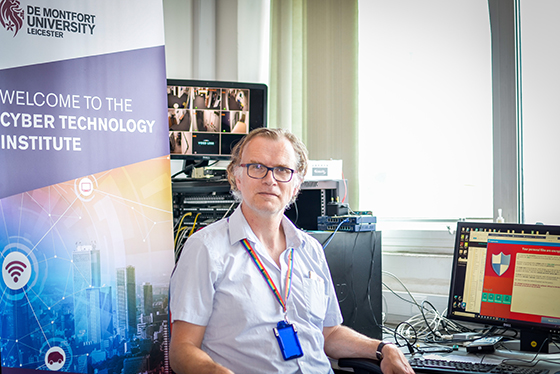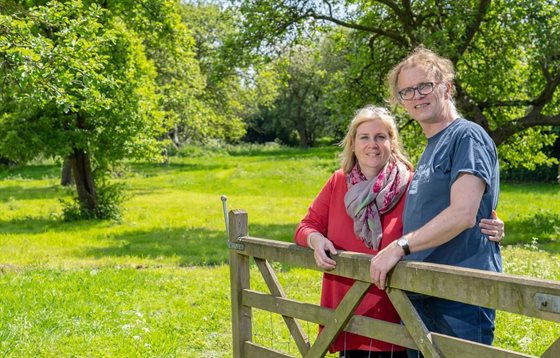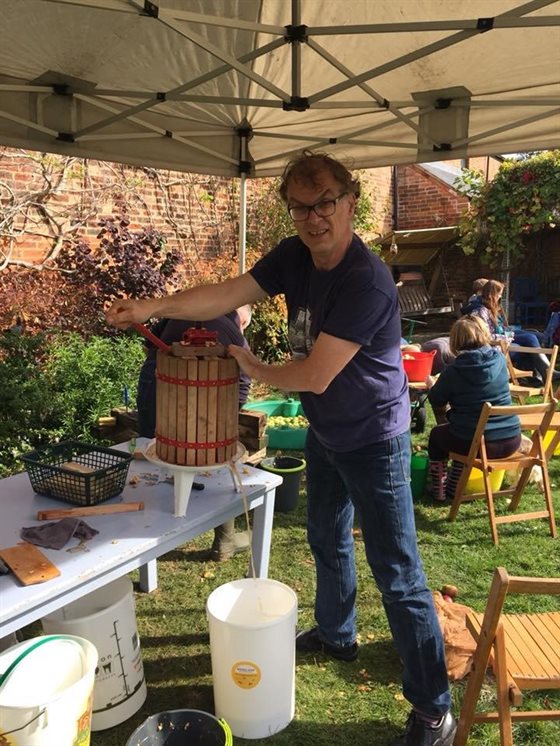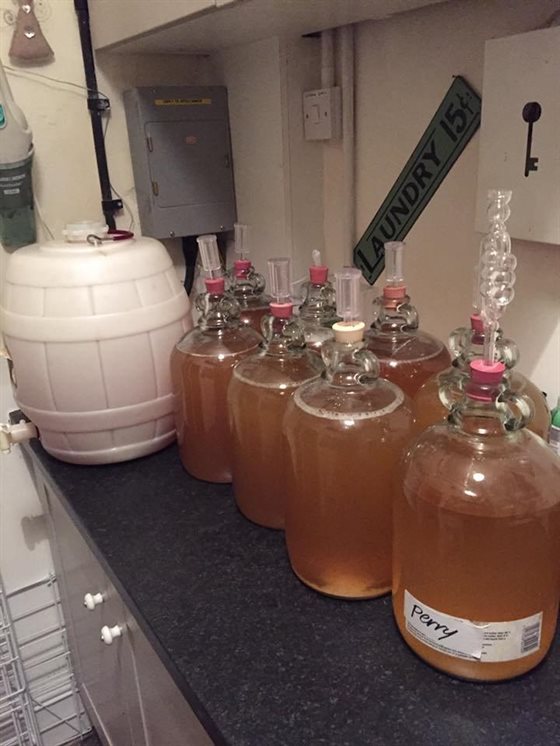There may be little connecting the high-tech challenges of cybersecurity with the ancient arts of cider-making, but one of the leading research professors at De Montfort University Leicester (DMU) is a bit of an expert in both.
Eerke Boiten is Director of DMU’s Cyber Technology Institute, leading research projects in fields including cybercrime, ransomware, cryptography and privacy. He has particular interests in crossovers with other disciplines, including law, criminology, economics, and psychology.

Eerke Boiten heads up DMU's Cyber Technology Institute
His active engagement in policy and public debate on issues such as data privacy and cybersecurity have made him one of the country’s leading voices on the subjects, making frequent media appearances and writing popular opinion pieces.
Computers have been part of his life since his secondary school in The Netherlands invested in its very first microcomputer, in the 1980s, but apple-pressing is a more recent attraction.
A big orchard is one of the features of the old manor farmhouse dating back to 1830 in which he and his family live, in the little Warwickshire village of Churchover, near Rugby.
Some of the trees are more than 100 years old and one of them produces more than 1,000 Bramley apples. The orchard also has some pear trees.
“We see ourselves as the custodians of the village orchard,” explained Eerke. “Nobody in the village wants to see it go to waste.
“I bake loads of cakes – I’ve got a Dutch cookbook and there’s a particular Dutch cake that they all like, and I share them with our neighbours and I bring them into work for every research grant that my team obtains.
“The orchard is an important place for me. In the summer I come home from work, I sort out the cooking (I’m the cook in the house) and immediately I’m off into the orchard. There are always things to do, especially the lawn mowing! It’s good to stick your nose into the fresh air but it’s a big job, taking a couple of hours to mow.”
His wife Gwen also spends hours with him in the orchard, pruning trees and cutting back hedges, occasionally helped by their children.

Gwen and Eerke in their orchard (Pic: Paul Bunyard www.wildaboutimages.com)
The all-year tending of the orchard reaches a climax at harvest time in the autumn and it has now become a village tradition that the Boiten family host an annual cider festival weekend, inviting friends and neighbours to help pick and sort the apples and pears before they go into a small cider press.
“It’s busy but fun,” Eerke added. “There’s a lot of cooking and preparing in the morning and then people are coming in and out all day. There’s obviously a bit of drinking and towards the end there’s a bit of dancing.”
The buckets of apple and pear juice are stored in their cellar, where they are eventually bottled as cider or perry. The family don’t sell it but share it round at Christmas with those who have helped with the harvest.
Eerke also enjoys listening to local bands playing gigs in the village hall, joining in on karaoke nights, and is a keen runner, completing a half-marathon for most of the past ten years.
Born in Warns, a small town in Friesland, Eerke and his brother and sister’s childhood saw the family move every four to six years to a new parish, following his father Rients, a minister in the Dutch Reformed Church. His mother, Betty, worked from home, translating books from English into Dutch.
“My biggest impression of England as a youngster was when there was a group visiting from Crediton near Exeter, which had historical links with our town,” he said. “They needed a translator but my mum could not make it so I did it.
“I was only 12 or 13 but I found it interesting. Our contact with the vicar from Crediton still exists and it was our family connections that got me interested in England.”
He was a bright, studious, boy who also loved music. A friend was in a blues band and Eerke used to cycle to gigs all over the area, including once a 20-mile ride each way to see The Cure perform in a nearby town.

Eerke hard at work during his family's annual cider festival
In those days home computers were in their infancy and it wasn’t until the first one arrived at his secondary school in Dokkum that he became interested and joined the school computer club. It was a Tandy TRS80 model, which the school physics teacher used to take home at weekends.
“I didn’t own my own computer until after university,” recalled Eerke, “but I played on ones belonging to friends.”
But he had the bug, and enrolled to study a degree in Informatics (Computing) at the University of Twente, where he met his future wife, Gwen, a teacher training student.
“My final year project was very much research oriented. I was not very organised or systematic about it, but I was very curious and had a lot of ideas. I would have had a top mark if I had been better organised so I was suitably encouraged to carry on my studies.”
A PhD in Nijmegen and post-doctoral research at Eindhoven followed but in the mid-90s the job market was lean, so the couple happily moved to England for Eerke to to take up a postdoctoral role at the University of Kent in Canterbury which eventually led to him leading its research group in cybersecurity.

...and the finished product!
Two notable books and running international workshops established Eerke’s reputation as one of the top 50 world experts in a small research niche. The first 20 years of his research career focused on quite mathematical computer software fields, before he embarked on quite a shift.
“I had one PhD student who was interested in cryptography and asked if we could apply my stuff to that field, so I did. It was just at the point when the whole cybersecurity thing kicked off.
“As cybersecurity took off, the world was interested and universities were being asked to look at it. That involved linking to other disciplines and I got drawn into news reporting of cybersecurity. Our research on a survey we did into cybercrime came out in 2013 in late August, a time when there’s no news about, so it made all the national newspapers.
“It was exciting and different and I suddenly realised journalists needed things explaining in a different way. I was lucky to get some training with an ex-TV journalist and it was when The Conversation was just starting off and in one month they even asked me to write for them once a week.
“I enjoyed it and saw there was space for a technologies-informed perspective on policy-making, particularly in the privacy sphere.”
By then, he and his wife had four children and Gwen’s career as an educational developer at universities had blossomed, first at Kent then Bath. It prompted a family move to nearby Trowbridge, with Eerke switching to part-time hours, only travelling to Canterbury two days a week until, in 2017, the post popped up to head up DMU’s Cyber Technology Institute - he was a perfect fit.
A year earlier, Gwen had moved to the University of Warwick where she has since been appointed as a Deputy Pro Vice-Chancellor, and the family had settled in Churchover, beginning their love affair with apples, orchards and cider.
Posted on Friday 24 May 2019